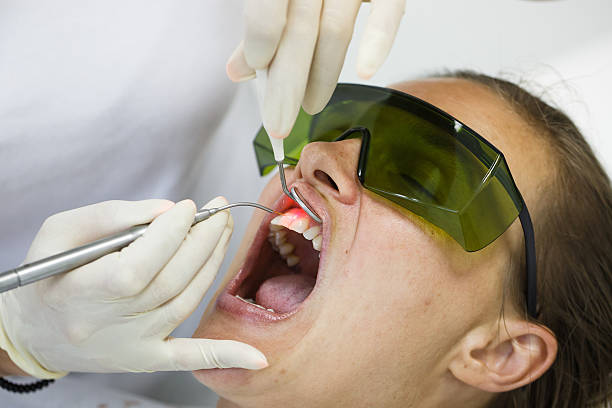Laser dentistry is the use of lasers to treat a number of different dental conditions. It became commercially used in clinical dental practice for procedures involving tooth tissue in 1989.
Laser dentistry potentially offers a more comfortable treatment option for a number of dental procedures involving hard or soft tissue compared to drills and other non-laser tools.
LASER stands for “light amplification by the stimulated emission of radiation.” The instrument creates light energy in a very narrow and focused beam. This laser light produces a reaction when it hits tissue, allowing it to remove or shape the tissue.
Laser dentistry is used in a variety of procedures, including:
- treating hypersensitivity
- treating tooth decay
- treating gum disease
- whitening teeth
Lasers can make dental treatments more efficient, cost-effective, and comfortable. The Food and Drug Administration (FDA) has approved laser dentistry as a treatment option for several dental conditions.
Applications of LASERS in Dentistry : -
How are laser treatments Performed?
Common soft tissue procedures include:
- Treating a “gummy smile.” Lasers are used to reshape gum tissue associated with a “gummy smile,” in which the gums’ length covers much of the tooth. Gum reshaping and Contouring for better smile.
- Crown lengthening. This procedure reshapes both gum tissue and bone for healthier tooth structure, which helps with placing restorations on the teeth.
- Treating tongue frenulum attachment. Those with a thick or tight frenulum (the fold of skin under the front part of tongue that anchors to the mouth floor) may benefit from a laser frenectomy. This treatment helps children whose restricted frenulum causes them to be tongue-tied, have difficulty breastfeeding, or have a speech impediment.
- Removing soft tissue folds. Lasers can remove soft tissue folds from ill-fitting dentures without pain or sutures.
- Diode lasers have the ability to kill bacteria and activate the growth of tissues. Additionally, it provides relatively bloodless surgical & post surgical courses with minimal scarring and swelling.
- Exposure of unerupted or partially erupted tooth.
- Treat cold sores and mouth ulcers
- Removal of inflamed hypertrophic tissue and miscellaneous tissue
- Laser depigmentation
- Laser flap surgery more efficiently removes the damaged and granulation tissue without bleeding and provides better vision
Benefits: –
- Minimizes bleeding
- Bacterial infections are minimized because the lasers sterilize the area being treated
Wounds heal faster and tissues can be regenerated Usage of laser in the dentistry industry has proven to be an efficient method for increasing dental care performance, precision, convenience, and cost and comfort.

O Shreeji dental clinic and implant center gives you the best treatment options with advanced technology. Compared to the traditional dental drills, laser treatments would cause less pain, thus reducing the need for anesthesia reduces anxiety in the patients regarding uncomfortability of dental surgical blades, minimizing bleeding and swelling during soft tissue treatments, and preserving healthier teeth during cavity removal.


